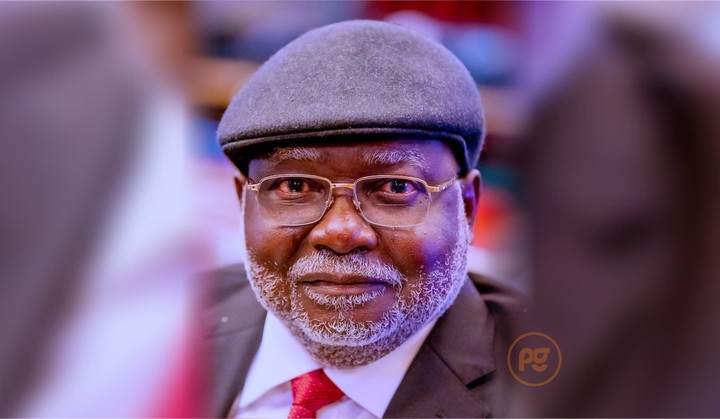There were similar reactions when the CJN’s son was one of 23 sworn-in as Justices of the Federal High Court in Sept 2023
Again, reportedly his nephew, was sworn-in as a Justice of the Appeal Court in Sept 2023
The Chief Justice of Nigeria, Olukayode Ariwoola, has appointed his younger brother, Adebayo Ariwoola, as the new auditor for the National Judicial Council (NJC), Peoples Gazette can report based on confirmations obtained last week.
The appointment places the younger Mr Ariwoola in a key position overseeing the internal audit unit of the NJC, a role with substantial authority to ensure financial integrity and responsibility within the commission. He is now responsible for evaluating the commission’s internal controls, scrutinising accounting processes, and ensuring compliance with legal standards.
Justice Ariwoola, who holds a position of near supreme authority with vast powers within the judiciary, now has a direct family link to the head of a crucial oversight unit—arguably the only unit capable of exercising independence and effectively checking and balancing any excesses within the CJN’s domain.
When contacted by The Gazette, the spokesperson of the NJC, Soji Oye, said he could not say “any word” on the matter. This outlet could not immediately reach the spokesman for the Supreme Court, Festus Akande, for comments.
Mr Ariwoola’s appointment, despite his relationship with the chief justice, amplifies concerns surrounding potential conflicts of interest and could be reflecting a stealth consolidation of power within the judiciary in ways that raise questions about the internal transparency that is fundamental to the integrity of any institution.
“It is about transparency here,” Chido Onumah, an anti-corruption campaigner, said. “There is no chance that the auditor will do anything to the detriment of his older brother, and there lies the fundamental issue with the appointment.”
Mr Onumah, who coordinates the African Centre for Media and Information Literacy (AFRICMIL), said the perception carries weight and that the chief justice should ordinarily be aware of this.
“Even if the brother were qualified to be the auditor, it is part of the sacrifices that they must collectively make for the sanctity of the chief justice’s office, for being in leadership position,” said Mr Onumah.
He added, “If the brother were appearing before him in a case, his opponent could validly ask Justice Ariwoola to recuse himself from the matter, and the same logic just follows that two members of the same family cannot be watching over each other in a government institution.”
Mr Ariwoola was previously an accountant with the NJC before his promotion to the top-level role, an action public affairs analyst Lanre Suraj believes should be given the benefit of the doubt.
“We should be fair to assume that the NJC will not skip critical hierarchies to appoint the brother of the CJN as auditor,” he said. “Every civil servant has the right to aspire to senior positions within their sphere.”
But Mr Suraj, in another breath, admits the complexity of the situation when he said both the CJN and the NJC as a body ought to “show more respect” for the conflict of interest that is rather glaringly shown.
Whoever will assume the office of an auditor should be “impartial” and “upright,” “having a level of independence,” Mr Suraj said. “Public expectation and assumption will not favour them (the CJN and his brother) in that consideration.”
“For me, I think it will be more than important for the CJN and the NJC to find a way around it without putting both the office of the CJN and that of the auditor in that moral complications and burden before the public,” he added.
This development coincides with a tumultuous phase in the relationship between the judiciary and the general public. The judiciary’s recent string of critical rulings on issues central to the very fabric of the country’s democracy has been marked by a trend of condescending dismissal of public opinion.
Major jurists have adopted a defensive posture that deflects public opinion despite growing scepticism about the judiciary’s overall image.
Observers maintained that Justice Ariwoola’s recent declarations asserting that public opinion does not influence judicial responsibilities, appear to embody a broader trend within the judiciary. This stance, purportedly grounded in legal principles, overlooks a fundamental reality: numerous protests against court rulings stem from the perceived substitution of justice and legal fairness with expedient technicalities.
This sentiment was notably expressed earlier in September when members of the appellate court panel that presided over the presidential election petition tribunal publicly trashed passionate calls for justice from the citizenry and dismissed them as orchestrated tactics by opposing political parties seeking to challenge election results and intimidate the judiciary.
Juwon Sanyaolu, the director of the Take-it-Back Movement in Nigeria, expressed concern over what he describes as a lack of attention from almost every arm of the government towards how people perceive the institutions they preside over.
In his comment, Mr Sanyaolu highlights a worrying trend, saying there appears to be minimal consideration for public opinion and perception in various government branches.
“We are witnessing a system of ‘anything goes’ under the ruling All Progressives Congress where senior public officials have no regard for what is publicly tenable,” he said. “I think it is condemnable and improper.”
Mr Sanyaolu says the possibility of encroaching on the integrity of the auditor’s office is not just a hypothetical scenario but a real threat with a visible basis of assumption.
“We have seen the corruption of due process and public institutions on many fronts. There have been repeated internal disagreements within the judiciary itself about the disbursement of the funds it receives, so the fact that the auditor could easily become his brother’s accomplice should there be an infringement or abuse of power if not far-fetched,” he added.
It is not uncommon for judiciary members to question the financial planning and expenditures overseen by the chief justice and other directors within the institution. Past complaints have been raised with strong-worded memos seeking executive intervention to address deteriorating working conditions for senior judges despite the financial allocations received.
In 2020, 13 justices of the Supreme Court called out the chief justice based on deteriorating work conditions. One of the justices who signed the petition, Musa Dattijo Mohammed, would assert in his retirement speech later in 2023 that the over N160 billion the federal judiciary received in the allocation has not trickled down into easier working conditions for the judges.
“Notwithstanding the phenomenal increases in the sums appropriated and released to the judiciary, Justices and officers’ welfare and the quality of service the judiciary render have continued to decline.
“It is instructive to enquire what the judiciary also does with its allocations. Who is responsible for the expenditure? An unrelenting searchlight needs to be beamed to unravel how the sums are expended,” he said.


